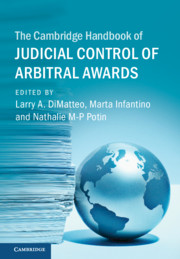Book contents
- The Cambridge Handbook of Judicial Control of Arbitral Awards
- The Cambridge Handbook of Judicial Control of Arbitral Awards
- Copyright page
- Dedication
- Concise Contents
- Contents
- Contributors
- Preface
- Part I Vacating Commercial Arbitration Awards
- Part II Enforcing Commercial Arbitration Awards
- Part III Scope and Interpretation of Arbitration Clauses
- 7 Judicial Interpretation of Standard Clauses
- 8 Industry-Specific Clauses and Their Interpretation
- 9 Drafting, Interpretation, and Enforcement of Commercial Arbitration Clauses
- Part IV Judicial Control of Arbitral Awards
- Part V Summary and Findings
7 - Judicial Interpretation of Standard Clauses
from Part III - Scope and Interpretation of Arbitration Clauses
Published online by Cambridge University Press: 08 October 2020
- The Cambridge Handbook of Judicial Control of Arbitral Awards
- The Cambridge Handbook of Judicial Control of Arbitral Awards
- Copyright page
- Dedication
- Concise Contents
- Contents
- Contributors
- Preface
- Part I Vacating Commercial Arbitration Awards
- Part II Enforcing Commercial Arbitration Awards
- Part III Scope and Interpretation of Arbitration Clauses
- 7 Judicial Interpretation of Standard Clauses
- 8 Industry-Specific Clauses and Their Interpretation
- 9 Drafting, Interpretation, and Enforcement of Commercial Arbitration Clauses
- Part IV Judicial Control of Arbitral Awards
- Part V Summary and Findings
Summary
Arbitration is routinely said to be based on consent. Indeed, the consensual nature of arbitration is perhaps its most influential feature, operating both to restrict domestic court involvement in arbitral proceedings as well as limit the review of awards by national courts of law. It is also the consensual nature of arbitration, however, that justifies a domestic court’s power to review an arbitral agreement, especially when a party against whom arbitration is brought denies that it agreed to arbitrate a dispute. In essence, the argument has long been that because arbitration is based on consent, parties that have not agreed to arbitrate should not be required to do so. However, as long as only parties who have agreed to arbitrate are required to do so, there are few legitimate reasons for court involvement in the arbitral process or court review of arbitral awards. The parties agreed to arbitrate and thus should live with the consequences of that agreement.
Keywords
- Type
- Chapter
- Information
- Publisher: Cambridge University PressPrint publication year: 2020

